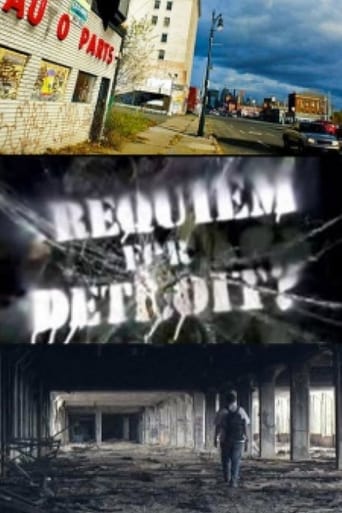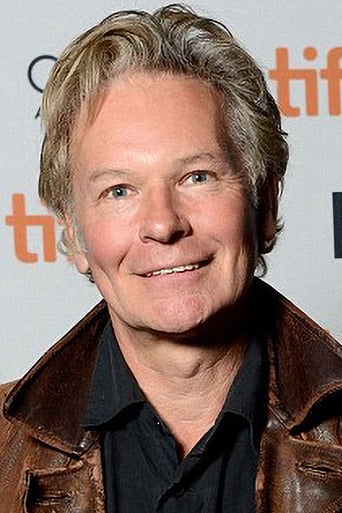A look at post-industrial Detroit and its burgeoning urban agricultural movement.


Reviews
I wanted to like this documentary, because it was a great topic (the city) and it really pulled up a lot or research, interviews, footage, and history. It has a title that tells a story in itself, and it is about a city with a story to tell. And, any scene taken in isolation seems really good. It's how it was put together that is a mess.And wow, what a mess this documentary is (there is not polite word for it) it is a cluster#**k of a story. They took some decent narratives by the people they interviewed, and dropped completely random footage, music, and history over the top of it in no order what-so-ever.If there is any "order" to this mess, it is "things were good, it's bad now. Things were bad, it's bad now. Things were good, it's bad now." If ending with "it's bad now" tells a story, I guess? But, they told this story so horribly, they jumped right from "Paris of the Midwest" to "race riots" to "high center of fashion in the US and children safe an no one had to watch them" without ANY transitions Just giving extreme examples of raising wages of American workers, to race tension, to WWII hero's, to violent race issues (again), to cultural melting pot, to poverty, back to beacon of culture, with no transitions or reasons, over and over. Dramatic? YES. Reasonable explanations? No.Sure, Detroit's history is complex. But if this documentary explains it, it's in a way that says "on Monday, Wednesdays, and Friday, Detroit is wealthy, happy, safe, and booming, but on Tuesday and Thursday they are violent and irrational. Oh, but on weekends they were poor but friendly. See how easy it is to understand?" ? WHAT?The documentary does document some of the more epic moments of Detroit's history, but they are pulled so out of context, and mixed up in the weird blender of this director and producer that it's just almost pointless to even watch.
Detroit might be anywhere. A city built on promises and wealth from the powers that be that often shape countries. A city left bereft of wealth and promise by the people who created it not so long ago.Temple's documentary is a strong message of what can happen should the worst happen. It reminded me of how reliant we are on the promises of big business and when the power goes out it might not come back on.Having never been to Detroit I wondered how this once burgeoning city, like all cities, could fall and emerge in the modern world like a post-apocalypse disaster town, where anarchy ruled. The word 'apocolypse' comes from ancient Greek and it translates as 'rebirth' (sic) and anarchy in Detroit is not as bad as it seems to Temple, as the city can only pick itself up from rock bottom.The documentary is solid and provides an insight into a city that is the butt of a lot of jokes in the US. This city is no joke if we take the future of capitalism seriously and Temple's Requiem For Detroit will be remembered as a non-sectarian view of capitalism gone awry.
This documentary portrait of a post-industrial future, of which the city of Detroit is the forerunner, is a true work of genius. In contrast to the egotistical, ranting and highly politicised film about Flint, Michigan, made by Michael Moore in 1989 (ROGER & ME), this film contains no political statement at all. It doesn't need to. The collapse of our civilisation as we know it is no longer a mere political issue, nor is it the issue of the personality of an egomaniac like Moore who wants to call attention to himself in his baseball cap. Nowhere does the director Julien Temple intrude upon this film (even though he is the narrator). He stands backs and lets the facts speak. That is the purest form of journalism. But the skill and brilliance of his technique, his editing, his montages, his use of music and startling sound effects, his interviewing methods (he is always edited out), his haunting images, his sense of atmosphere, his unerring awareness of the drama of every moment, his profound sense of historical continuity, are all miraculous. This is what real documentary film-making should be. Alas, the story he has to tell is one of the saddest stories there is: it is the story of the end, but towards the latter part of the film, there is also the solid hope of a new beginning. The images of destruction in Detroit are so shocking, so unbelievable, that we truly do see the End of the World in front of our eyes. Words are inadequate to describe this film, you have to see it. Nothing you have ever heard or imagined can prepare you to see on film the true state of affairs in Detroit today. This is the story that all the newspapers and magazines of the world do not cover, will not cover, dare not cover. Just think of any city you know, and imagine it abandoned and ruined, and you have the Detroit of today and your favourite city sometime tomorrow. Gigantic buildings, five star hotels, huge department stores ('the seventh floor was so lovely, it sold the most expensive women's clothing and luxury furs'), the mammoth headquarters buildings of some of the world's largest corporations, are all either ruined with trees growing out of them or are already demolished. 50,000 homes have now been demolished in Detroit. Tens of thousands more are burnt out and abandoned, with collapsing ceilings and rotting structures covered in vines. In this film, we revisit the original factories of Henry Ford, now totally ruinous. We see vintage film of his production lines, we see the 1950s ads of gas-guzzlers with fins and the fantasy visions of an eternal and blissful future, we see footage of the 1967 racial riots, we see Michigan Governor George Romney (father of Mitt) telling us everything is going to be just fine. But nowhere does the commentary rub it in. For those of us who know that Henry Ford was an overt and passionate supporter of the Nazi Party and Adolf Hitler before the War, this all makes sad sense. We then see how he saved his collapsing car empire by turning it into 'the arsenal of America', by producing the tanks to kill the very Nazis he had supported. Nobody needs to tell us the message on the sound track, or to interpret anything, for we can see it clearly enough. It is all there, the whole message. So now they are growing vegetables where highways used to be, that is, when the roaming crack cocaine gangs do not murder them. There are heartbreaking interviews with prison inmates who have more to say about their city than and vacuous comments by what remains of 'the city fathers'. We truly get the inside story, or should I say the many inside stories. It is amazing how Julien Temple found all these highly articulate ordinary people whose tales are so spellbinding, and whose simple wisdom is so awe-inspiring. Today Detroit, tomorrow the world. Just watch it. Don't even think about not watching it.
There's a scary book called 'Blood River' about the collapse of civilisation in Congo; its most frightening moment is when the author tells of discovering the relics of a railway in the middle of a forest, as if it was ancient archaeology. Yet Julien Temple's documentary about Detroit shows us that the west should not necessarily be so smug. The rate at which nature is reclaiming the motor city from man is alarming; if you want to know how long humanity might survive some disaster that took the impetus out from the economy, the answer is apparently just a few decades. The cause in Detroit's case is as follows: the collapse of the U.S. car industry; the availability of land and of cars (increasingly built elsewhere) to facilitate commuting from outside the city limits; and a tax system that provides no breaks to depopulating communities. The film combines a concise history of the city with footage of its increasing dereliction and a soundtrack taken mainly from its rich musical history; except for some odd, intrusive sound effects, it's mostly excellent and gripping. But above all else, proof that one doesn't need to travel to Africa to witness the descent on man.



